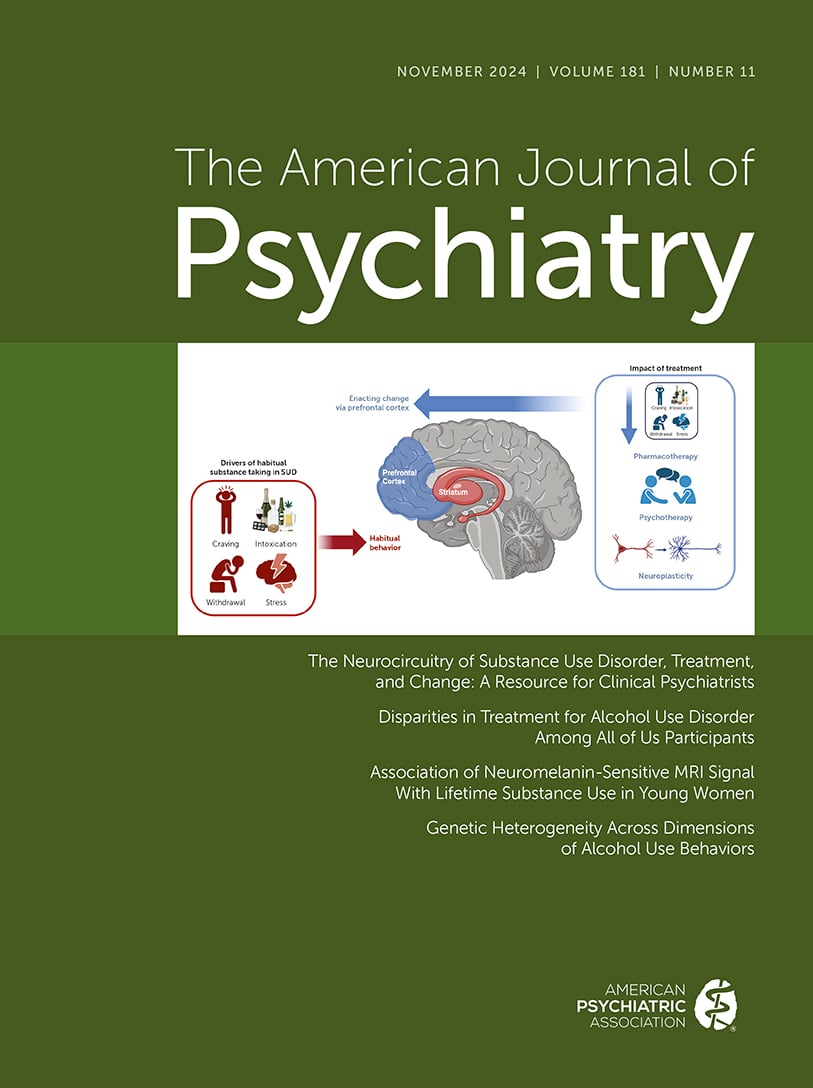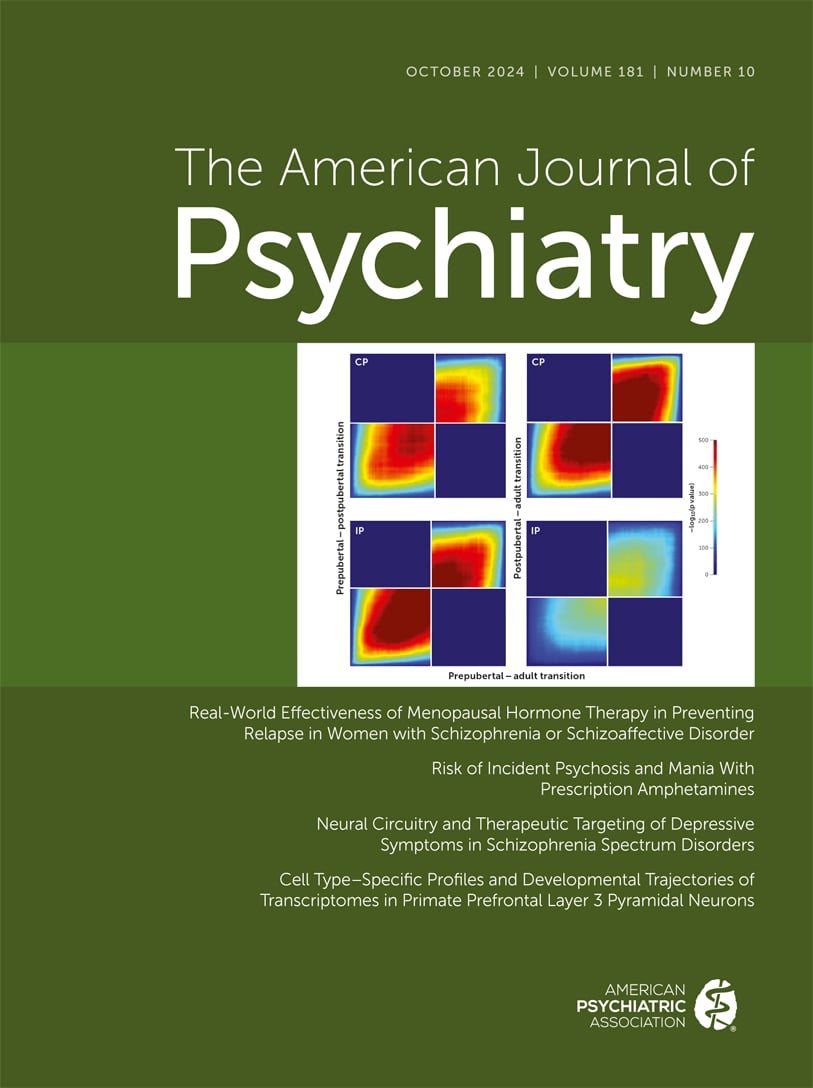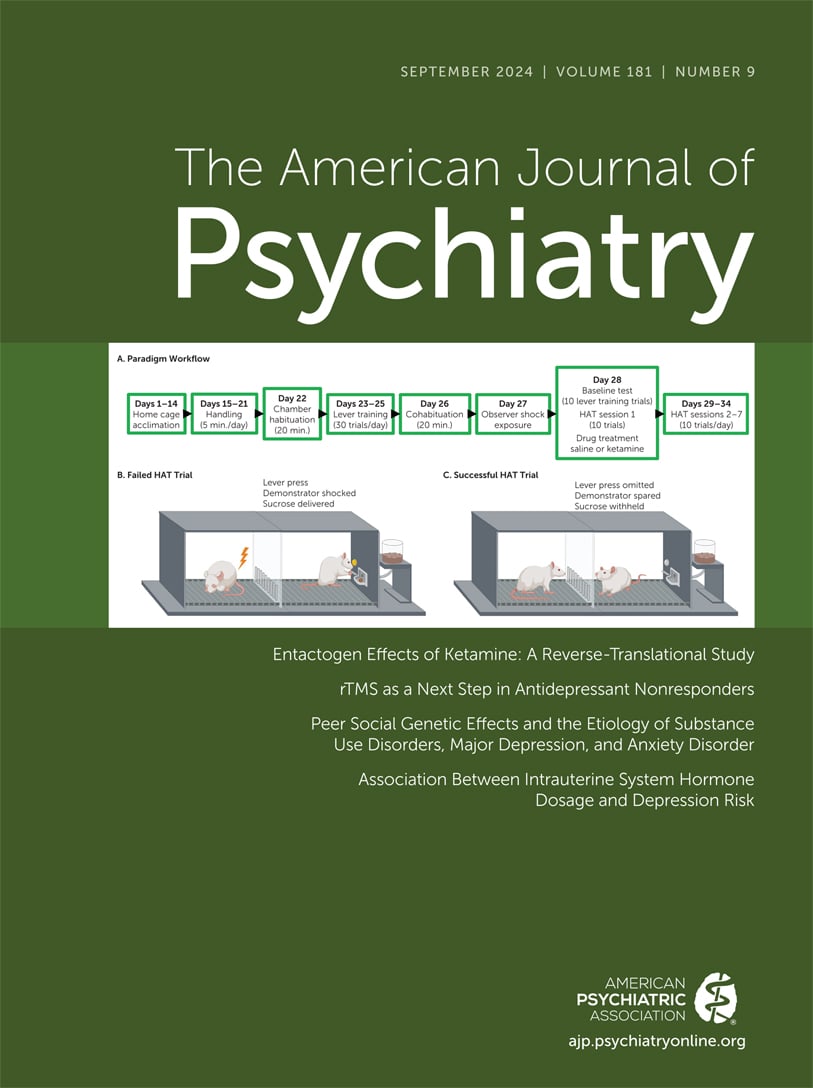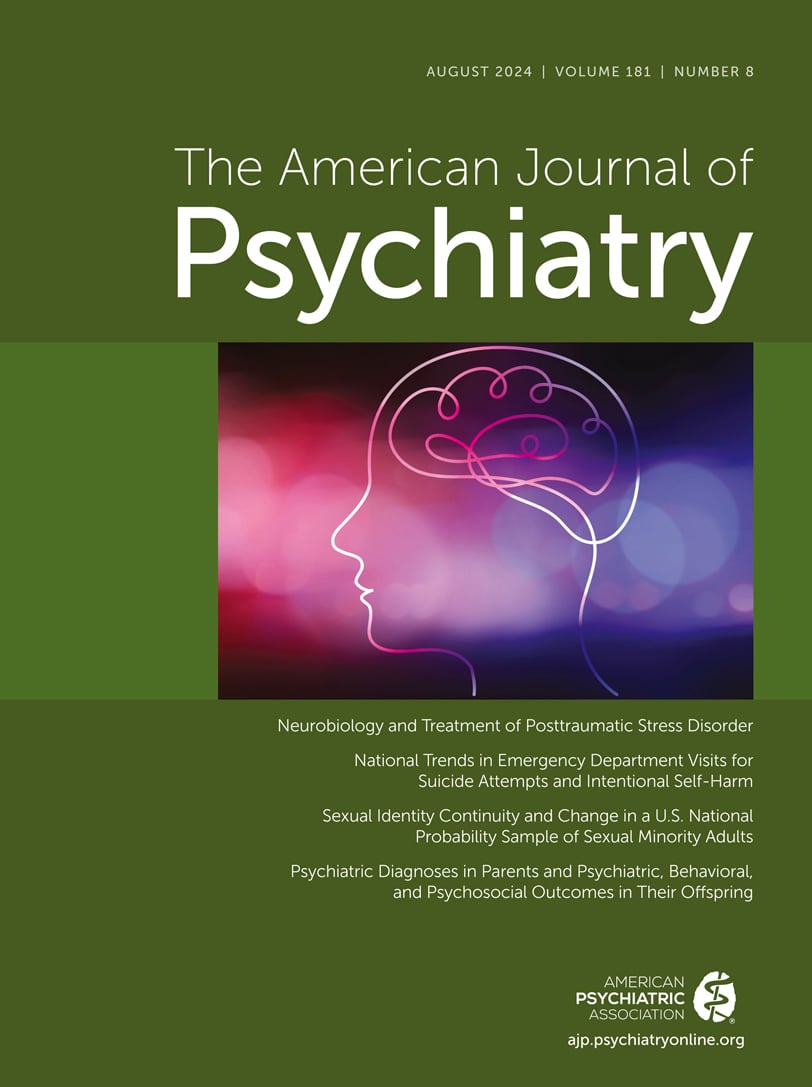American Journal of Psychiatry
- Volume 130
- Number 7
- July 1973
Article
Publication date: 01 July 1973
Pages754–760An enzyme capable of forming the hallucinogen dimethyltryptamine was found in human red blood cells, plasma, and platelets. The enzyme activity in red blood cells and plasma was not significantly different in psychiatric patients from that in normal ...
https://doi.org/10.1176/ajp.130.7.754Publication date: 01 July 1973
Pages761–764At the completion of APA's two-year focus on "Alternatives to Violence," the authors assess this effort as it was pursued at the district branch level. They compare the different strategies (both unsuccessful) used by two hypothetical district branches ...
https://doi.org/10.1176/ajp.130.7.761Publication date: 01 July 1973
Pages765–768Sex offender laws and other forms of preventive detention designed to protect the public from dangerous individuals have been criticized because of their subjectivity. The authors propose legislation that would ensure against abuse of the laws by the ...
https://doi.org/10.1176/ajp.130.7.765Publication date: 01 July 1973
Pages769–773The authors report on a year's experience with psychiatric patients from aborigine tribes in West Malaysia. Of the 20 cases seen, all but one were psychotic and 16 were also classified as schizophrenic. Withdrawal and running away were common symptom ...
https://doi.org/10.1176/ajp.130.7.769Publication date: 01 July 1973
Pages774–777Indian women from a Northwest coastal tribe were noted to have a high prevalence rate of duodenal ulcer, about four times greater than that for non-Indian women and above the rate of occurrence in Southwestern Indians. The authors analyze this high rate ...
https://doi.org/10.1176/ajp.130.7.774Publication date: 01 July 1973
Pages778–782The impact of separation from a parent is recognized as a crucial factor in a child's development. Forced military separations also lead to clinically observable reactions in children. This long-term loss of the father is considered a developmental ...
https://doi.org/10.1176/ajp.130.7.778Publication date: 01 July 1973
Pages783–786The background, hereditary data, history of organic stress, intellectual development, types of treatment received, and outcome are described for 100 children diagnosed as schizophrenics at Bellevue Hospital from 1935 to 1952. The author discusses the ...
https://doi.org/10.1176/ajp.130.7.783Publication date: 01 July 1973
Pages786–789Twelve families in which only one child had had severe croup before the age of five were examined several years later. Parents rated the behavior of the proband and one of his siblings separately, and each child rated his parents' attitudes toward him. ...
https://doi.org/10.1176/ajp.130.7.786Publication date: 01 July 1973
Pages789–790The psychiatric consultations done in a children's hospital over an 11-month period were analyzed. Major reasons for referral included a symptom of unknown etiology (possibly psychosomatic), suspected depression, and behavior problems on the ward. ...
https://doi.org/10.1176/ajp.130.7.789Publication date: 01 July 1973
Pages791–792Patients with hyperactive child syndrome frequently have relatives who were hyperactive as children or who are alcoholic adults. In their study the authors found that the distribution of these conditions in the families of 59 hyperactive children supports ...
https://doi.org/10.1176/ajp.130.7.791Publication date: 01 July 1973
Pages792–796The authors added sessions of videotape feedback to a treatment program for hyperkinetic children that originally also employed chemotherapy and parental group counseling. Parent-child interactions were videotaped and immediately replayed to the parents ...
https://doi.org/10.1176/ajp.130.7.792Publication date: 01 July 1973
Pages796–798Children being treated with methylphenidate or dextroamphetamine for minimal brain dysfunction syndrome and subsequent hyperkinetic impulse disorder may develop annoying side effects. A pilot study substituting caffeine, in the form of two cups of regular ...
https://doi.org/10.1176/ajp.130.7.796Publication date: 01 July 1973
Pages801–804Fluphenazine enanthate and fluphenazine decanoate—two long-acting neuroleptics—were administered in a controlled comparative study to 30 patients with acute psychoses of different character and origin. The study compared the duration of action and ...
https://doi.org/10.1176/ajp.130.7.801Publication date: 01 July 1973
Pages805–808Most articles written about paraprofessionals have discussed their new and expanded roles, their assumption of tasks not dealt with by professionals, and their training by professional mental health workers. This paper looks at the other side of the coin: ...
https://doi.org/10.1176/ajp.130.7.805Publication date: 01 July 1973
Pages808–812Chlorpromazine was found to reverse the antihypertensive effects of guanethidine six times in use with four moderately or severely hypertensive psychiatric patients. Haloperidol and thiothixene caused similar effects. It is postulated that this drug-drug ...
https://doi.org/10.1176/ajp.130.7.808Publication date: 01 July 1973
Pages812–814In order to evaluate the effectiveness of a drug education program, an intensive and costly three-week drug education course was given to 452 eighth-grade students. A similar group of eighth-graders who received minimal drug education served as controls. ...
https://doi.org/10.1176/ajp.130.7.812Publication date: 01 July 1973
Pages814–817The authors examine methods and summarize outcomes of interaction studies on the families of disturbed youths. Their own series of experiments is designed to yield interaction and perception measures using comparison groups of nonclinic and clinic famiies,...
https://doi.org/10.1176/ajp.130.7.814Publication date: 01 July 1973
Pages818–819The basic behavioral terms "aversive stimulation" and "negative reinforcement" are defined and the frequent misuse of these terms in the current literature is illustrated. The author notes the theoretical and clinical consequences of this misapplication, ...
https://doi.org/10.1176/ajp.130.7.818Publication date: 01 July 1973
Pages820–821The authors explore the process by which the concentration camp syndrome, which includes destructive self-identification, is perpetuated in the children of survivors in ways that engender depression, guilt, and aggression and inhibit autonomous growth. ...
https://doi.org/10.1176/ajp.130.7.820Past Issues
View Issues Archive
Vol. 181 | No. 11

Vol. 181 | No. 10

Vol. 181 | No. 9
